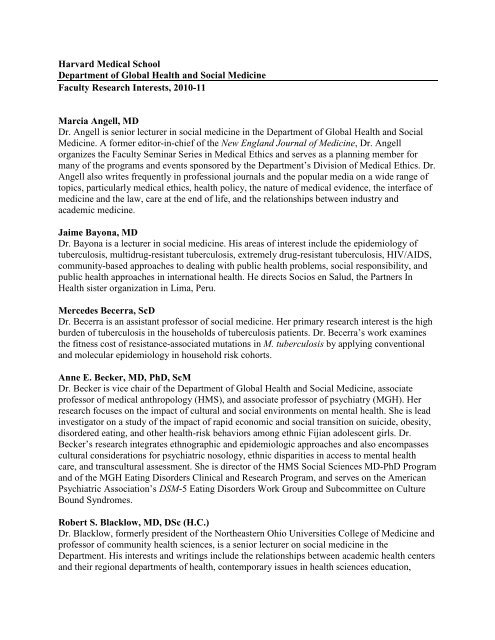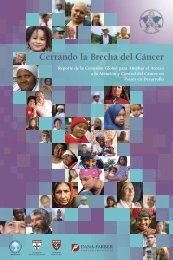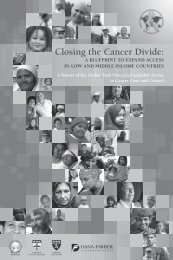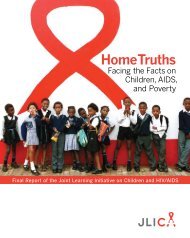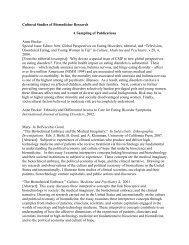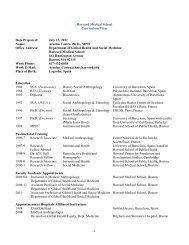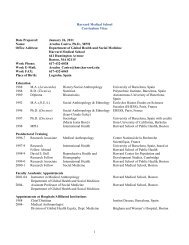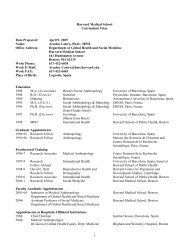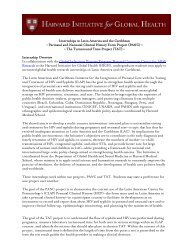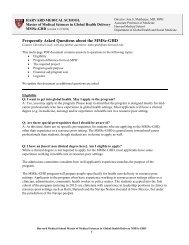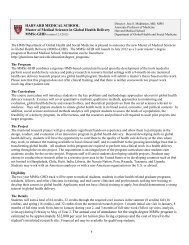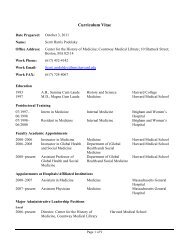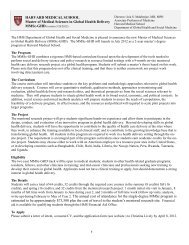Harvard Medical School - The Department of Global Health and ...
Harvard Medical School - The Department of Global Health and ...
Harvard Medical School - The Department of Global Health and ...
You also want an ePaper? Increase the reach of your titles
YUMPU automatically turns print PDFs into web optimized ePapers that Google loves.
<strong>Harvard</strong> <strong>Medical</strong> <strong>School</strong><br />
<strong>Department</strong> <strong>of</strong> <strong>Global</strong> <strong>Health</strong> <strong>and</strong> Social Medicine<br />
Faculty Research Interests, 2010-11<br />
Marcia Angell, MD<br />
Dr. Angell is senior lecturer in social medicine in the <strong>Department</strong> <strong>of</strong> <strong>Global</strong> <strong>Health</strong> <strong>and</strong> Social<br />
Medicine. A former editor-in-chief <strong>of</strong> the New Engl<strong>and</strong> Journal <strong>of</strong> Medicine, Dr. Angell<br />
organizes the Faculty Seminar Series in <strong>Medical</strong> Ethics <strong>and</strong> serves as a planning member for<br />
many <strong>of</strong> the programs <strong>and</strong> events sponsored by the <strong>Department</strong>’s Division <strong>of</strong> <strong>Medical</strong> Ethics. Dr.<br />
Angell also writes frequently in pr<strong>of</strong>essional journals <strong>and</strong> the popular media on a wide range <strong>of</strong><br />
topics, particularly medical ethics, health policy, the nature <strong>of</strong> medical evidence, the interface <strong>of</strong><br />
medicine <strong>and</strong> the law, care at the end <strong>of</strong> life, <strong>and</strong> the relationships between industry <strong>and</strong><br />
academic medicine.<br />
Jaime Bayona, MD<br />
Dr. Bayona is a lecturer in social medicine. His areas <strong>of</strong> interest include the epidemiology <strong>of</strong><br />
tuberculosis, multidrug-resistant tuberculosis, extremely drug-resistant tuberculosis, HIV/AIDS,<br />
community-based approaches to dealing with public health problems, social responsibility, <strong>and</strong><br />
public health approaches in international health. He directs Socios en Salud, the Partners In<br />
<strong>Health</strong> sister organization in Lima, Peru.<br />
Mercedes Becerra, ScD<br />
Dr. Becerra is an assistant pr<strong>of</strong>essor <strong>of</strong> social medicine. Her primary research interest is the high<br />
burden <strong>of</strong> tuberculosis in the households <strong>of</strong> tuberculosis patients. Dr. Becerra’s work examines<br />
the fitness cost <strong>of</strong> resistance-associated mutations in M. tuberculosis by applying conventional<br />
<strong>and</strong> molecular epidemiology in household risk cohorts.<br />
Anne E. Becker, MD, PhD, ScM<br />
Dr. Becker is vice chair <strong>of</strong> the <strong>Department</strong> <strong>of</strong> <strong>Global</strong> <strong>Health</strong> <strong>and</strong> Social Medicine, associate<br />
pr<strong>of</strong>essor <strong>of</strong> medical anthropology (HMS), <strong>and</strong> associate pr<strong>of</strong>essor <strong>of</strong> psychiatry (MGH). Her<br />
research focuses on the impact <strong>of</strong> cultural <strong>and</strong> social environments on mental health. She is lead<br />
investigator on a study <strong>of</strong> the impact <strong>of</strong> rapid economic <strong>and</strong> social transition on suicide, obesity,<br />
disordered eating, <strong>and</strong> other health-risk behaviors among ethnic Fijian adolescent girls. Dr.<br />
Becker’s research integrates ethnographic <strong>and</strong> epidemiologic approaches <strong>and</strong> also encompasses<br />
cultural considerations for psychiatric nosology, ethnic disparities in access to mental health<br />
care, <strong>and</strong> transcultural assessment. She is director <strong>of</strong> the HMS Social Sciences MD-PhD Program<br />
<strong>and</strong> <strong>of</strong> the MGH Eating Disorders Clinical <strong>and</strong> Research Program, <strong>and</strong> serves on the American<br />
Psychiatric Association’s DSM-5 Eating Disorders Work Group <strong>and</strong> Subcommittee on Culture<br />
Bound Syndromes.<br />
Robert S. Blacklow, MD, DSc (H.C.)<br />
Dr. Blacklow, formerly president <strong>of</strong> the Northeastern Ohio Universities College <strong>of</strong> Medicine <strong>and</strong><br />
pr<strong>of</strong>essor <strong>of</strong> community health sciences, is a senior lecturer on social medicine in the<br />
<strong>Department</strong>. His interests <strong>and</strong> writings include the relationships between academic health centers<br />
<strong>and</strong> their regional departments <strong>of</strong> health, contemporary issues in health sciences education,
access to health pr<strong>of</strong>essions careers by the social <strong>and</strong> economically disadvantaged, <strong>and</strong> ways in<br />
which physicians <strong>and</strong> their patients can communicate more effectively with each other. He is<br />
currently working on a longitudinal study <strong>of</strong> the outcome <strong>of</strong> an enhancement program to the<br />
health pr<strong>of</strong>essions <strong>of</strong>fered jointly by the <strong>Harvard</strong> Summer <strong>School</strong> <strong>and</strong> HMS in the 1960s <strong>and</strong><br />
1970s. He also serves as a faculty adviser to the HMS <strong>Medical</strong> Clinical Casebook Project.<br />
Allan M. Br<strong>and</strong>t, PhD<br />
Dr. Br<strong>and</strong>t is the Amalie Moses Kass Pr<strong>of</strong>essor <strong>of</strong> the History <strong>of</strong> Medicine at <strong>Harvard</strong> <strong>Medical</strong><br />
<strong>School</strong>, where he directs the Program in the History <strong>of</strong> Medicine. He currently serves as the dean<br />
<strong>of</strong> the <strong>Harvard</strong> Graduate <strong>School</strong> <strong>of</strong> Arts <strong>and</strong> Sciences <strong>and</strong> holds a joint appointment in the<br />
<strong>Department</strong> <strong>of</strong> the History <strong>of</strong> Science. Dr. Br<strong>and</strong>t earned his PhD in American history from<br />
Columbia University in 1983. His work focuses on social <strong>and</strong> ethical aspects <strong>of</strong> health, disease,<br />
<strong>and</strong> medical practices in the 20th-century United States. He has written on the social history <strong>of</strong><br />
epidemic disease, the history <strong>of</strong> public health <strong>and</strong> health policy, <strong>and</strong> the history <strong>of</strong> human-subject<br />
research, among other topics. His recent book on the social <strong>and</strong> cultural history <strong>of</strong> cigarette<br />
smoking, <strong>The</strong> Cigarette Century, was awarded the Bancr<strong>of</strong>t Prize in American History.<br />
Dan W. Brock, PhD<br />
Dr. Brock is director <strong>of</strong> the <strong>Department</strong>’s Division <strong>of</strong> <strong>Medical</strong> Ethics <strong>and</strong> <strong>of</strong> the <strong>Harvard</strong><br />
University Program in Ethics <strong>and</strong> <strong>Health</strong>. His current research is focused in two areas: first,<br />
health care resource prioritization <strong>and</strong> rationing, with special attention to the ethical issues raised<br />
in the construction <strong>and</strong> use <strong>of</strong> cost-effectiveness analyses. This work includes both philosophical<br />
analyses <strong>and</strong> policy applications in collaboration with, for example, the Ministry <strong>of</strong> <strong>Health</strong> in<br />
Thail<strong>and</strong> <strong>and</strong> the World <strong>Health</strong> Organization. His second research focus is on ethical issues in<br />
genetic selection, both to avoid disabilities <strong>and</strong> to enhance positive traits. Dr. Brock is on<br />
sabbatical during the 2010–11 academic year.<br />
Gene Bukhman, MD, PhD<br />
Dr. Bukhman is an assistant pr<strong>of</strong>essor <strong>of</strong> medicine <strong>and</strong> an assistant pr<strong>of</strong>essor <strong>of</strong> global health <strong>and</strong><br />
social medicine at <strong>Harvard</strong> <strong>Medical</strong> <strong>School</strong>. He is a cardiologist in the Division <strong>of</strong> <strong>Global</strong> <strong>Health</strong><br />
Equity at Brigham <strong>and</strong> Women's Hospital <strong>and</strong> in the Boston VA <strong>Health</strong>care System. He is the<br />
cardiology director for Partners In <strong>Health</strong>. Dr. Bukhman is an expert on strategic planning for<br />
noncommunicable disease control <strong>and</strong> serves as the Senior Technical Advisor on Noncommunicable<br />
disease to the Rw<strong>and</strong>an Ministry <strong>of</strong> <strong>Health</strong>. For the past 10 years, his research has<br />
focused on the political <strong>and</strong> historical context <strong>of</strong> interventions in this area, as well the evaluation<br />
<strong>of</strong> programmatic outcomes. In 2010, Dr. Bukhman was appointed as the director <strong>of</strong> the Program<br />
in <strong>Global</strong> Noncommunicable Disease <strong>and</strong> Social Change at <strong>Harvard</strong> <strong>Medical</strong> <strong>School</strong>.<br />
Arachu Castro, PhD, MPH<br />
Dr. Castro is assistant pr<strong>of</strong>essor <strong>of</strong> social medicine in the <strong>Department</strong> <strong>of</strong> <strong>Global</strong> <strong>Health</strong> <strong>and</strong><br />
Social Medicine, medical anthropologist in the Division <strong>of</strong> <strong>Global</strong> <strong>Health</strong> Equity at Brigham <strong>and</strong><br />
Women’s Hospital, <strong>and</strong> senior adviser for Mexico <strong>and</strong> Guatemala at Partners In <strong>Health</strong>. She is a<br />
fellow <strong>of</strong> the Holmes Society. Her major interests are how social inequalities are embodied as<br />
differential risk for pathologies common among the poor <strong>and</strong> how health policies may alter the<br />
course <strong>of</strong> epidemic disease <strong>and</strong> other pathologies afflicting populations living in poverty. As a<br />
medical anthropologist trained in public health, she works mostly in infectious disease <strong>and</strong><br />
<strong>Harvard</strong> <strong>Medical</strong> <strong>School</strong> <strong>Department</strong> <strong>of</strong> <strong>Global</strong> <strong>Health</strong> <strong>and</strong> Social Medicine<br />
Fall 2010 Faculty Research Interests, page 2
women’s health in Latin America <strong>and</strong> the Caribbean, including in Mexico, Argentina, Haiti,<br />
Cuba, Puerto Rico, Venezuela, Colombia, Peru, <strong>and</strong> the Dominican Republic. She is exp<strong>and</strong>ing<br />
her research to Nicaragua <strong>and</strong> other countries through the Latin America <strong>and</strong> Caribbean Initiative<br />
for the Integration <strong>of</strong> Prenatal Care with the Testing <strong>and</strong> Treatment <strong>of</strong> HIV <strong>and</strong> Syphilis (ILAP),<br />
which she directs in collaboration with UNICEF, UNAIDS, the Pan American <strong>Health</strong><br />
Organization (PAHO), <strong>and</strong> eight national AIDS programs. She is also the principal investigator<br />
<strong>of</strong> the Maternal Mortality Prevention Project in the Dominican Republic, Haiti, <strong>and</strong> Peru. Dr.<br />
Castro is the recipient <strong>of</strong> the 2005 Rudolf Virchow Award <strong>of</strong> the Critical Anthropology <strong>of</strong> <strong>Health</strong><br />
Caucus <strong>of</strong> the Society for <strong>Medical</strong> Anthropology, the 2009 Burke <strong>Global</strong> <strong>Health</strong> Fellowship <strong>of</strong><br />
the <strong>Harvard</strong> Institute for <strong>Global</strong> <strong>Health</strong>, the 2010 <strong>Harvard</strong> Catalyst Program for Faculty<br />
Development <strong>and</strong> Diversity Faculty Fellowship <strong>of</strong> <strong>Harvard</strong> <strong>Medical</strong> <strong>School</strong>, <strong>and</strong> the 2010<br />
Guggenheim Fellowship in Medicine <strong>and</strong> <strong>Health</strong> <strong>of</strong> the John Simon Guggenheim Memorial<br />
Foundation in New York. She has published two books <strong>and</strong> several articles in medical, public<br />
health, <strong>and</strong> anthropology journals.<br />
Eric Chivian, MD<br />
Dr. Chivian is director <strong>of</strong> the HMS Center for <strong>Health</strong> <strong>and</strong> the <strong>Global</strong> Environment <strong>and</strong> a lecturer<br />
on social medicine. <strong>The</strong> Center is engaged in a number <strong>of</strong> projects, including developing<br />
information <strong>and</strong> research in the area <strong>of</strong> climate change <strong>and</strong> energy, <strong>and</strong> two main aspects <strong>of</strong><br />
biodiversity:<br />
1. Trying to underst<strong>and</strong> why certain groups <strong>of</strong> organisms, including amphibians, some species <strong>of</strong><br />
bats, <strong>and</strong> certain insects, are undergoing rapid population declines. Some <strong>of</strong> the causes for these<br />
declines have been identified, including infectious diseases, exposure to certain pollutants that<br />
may suppress immunity, <strong>and</strong> habitat loss. Yet several other issues remain poorly understood—<br />
whether these factors are acting separately or together, why they are so lethal at the present time,<br />
<strong>and</strong> which ecosystem functions are being affected, particularly those relating to human health. In<br />
collaboration with other leading researchers, the Center is working to underst<strong>and</strong> the causes <strong>of</strong><br />
these population declines <strong>and</strong> the ecological <strong>and</strong> human health consequences.<br />
2. Reviewing <strong>and</strong> critiquing the scientific literature that has been used to justify the clear-cutting<br />
<strong>of</strong> 80- to 100-year-old mixed hardwood/conifer forests in New Engl<strong>and</strong>, <strong>and</strong> examining the<br />
ecological <strong>and</strong> public health impacts from such cutting. We will look, for example, at how clearcutting<br />
compromises the filtration <strong>of</strong> water <strong>and</strong> air pollutants, ecosystem functions <strong>of</strong> intact<br />
forests, <strong>and</strong> how the fragmentation <strong>of</strong> forests increases the risk <strong>of</strong> Lyme disease for those<br />
exposed to ticks at forest edges.<br />
Felton Earls, MD, DSc (Hon.)<br />
Dr. Earls is pr<strong>of</strong>essor <strong>of</strong> social medicine at <strong>Harvard</strong> <strong>Medical</strong> <strong>School</strong> <strong>and</strong> pr<strong>of</strong>essor <strong>of</strong> human<br />
behavior <strong>and</strong> development at the <strong>Harvard</strong> <strong>School</strong> <strong>of</strong> Public <strong>Health</strong>. He is principal investigator <strong>of</strong><br />
the Project on Human Development in Chicago Neighborhoods, a pioneering study on the causes<br />
<strong>and</strong> consequences <strong>of</strong> community violence. He is a coauthor <strong>of</strong> “Neighborhoods <strong>and</strong> Violent<br />
Crime: A Multilevel Study <strong>of</strong> Collective Efficacy,” originally published in Science (August<br />
1997). Since publication <strong>of</strong> this paper, the project’s multilevel, longitudinal design has yielded<br />
many important findings related to neighborhood effects on birth weight, child care, adolescent<br />
sexual health, asthma, mental health, <strong>and</strong> adult mortality. In a newer study initiated in 2002 in<br />
<strong>Harvard</strong> <strong>Medical</strong> <strong>School</strong> <strong>Department</strong> <strong>of</strong> <strong>Global</strong> <strong>Health</strong> <strong>and</strong> Social Medicine<br />
Fall 2010 Faculty Research Interests, page 3
Tanzania, Dr. Earls is conducting a cluster r<strong>and</strong>omized control trial with colleague Mary<br />
Carlson. <strong>The</strong> trial is designed to reduce stigma <strong>and</strong> increase knowledge <strong>of</strong> HIV/AIDS at the level<br />
<strong>of</strong> communities. Across the University, he directs the Behavioral <strong>and</strong> Social Science Program at<br />
the Center for AIDS Research at HMS <strong>and</strong> the South Africa Fellows Program. His training is in<br />
pediatrics, psychiatry, <strong>and</strong> public health.<br />
Nir Eyal, DPhil<br />
Dr. Eyal is assistant pr<strong>of</strong>essor <strong>of</strong> social medicine in the Division <strong>of</strong> <strong>Medical</strong> Ethics <strong>and</strong> is on the<br />
faculty <strong>of</strong> the <strong>Harvard</strong> Program in Ethics <strong>and</strong> <strong>Health</strong>. Dr. Eyal is currently writing on ethical<br />
ways to address critical health-worker shortages; health care rationing in resource-poor settings;<br />
markets in human organs; the ethical grounds for informed consent; personal responsibility for<br />
health; the ethics <strong>of</strong> translational research; measuring status-quo bias in disability adaptation; <strong>and</strong><br />
accrediting corporations for improving global health. Dr. Eyal is also completing a book that<br />
defends a consequentialist approach to respect for persons <strong>and</strong> applies that approach to<br />
normative questions in bioethics <strong>and</strong> political theory. Research outside bioethics surrounds<br />
egalitarian theory, self-ownership, basic income guarantee, political domination, <strong>and</strong><br />
consequentialism. During the 2009–10 academic year, Dr. Eyal was a faculty fellow at the Safra<br />
Center for Ethics, <strong>Harvard</strong> University.<br />
Amy Farber, PhD<br />
Dr. Farber’s research focuses on cultural, operational, <strong>and</strong> scientific challenges associated with<br />
accelerating the pace <strong>of</strong> patient-centered multidisciplinary translational research. She is<br />
especially focused on addressing areas <strong>of</strong> significant unmet medical need. Her work as founder<br />
<strong>and</strong> CEO <strong>of</strong> the LAM Treatment Alliance, a Cambridge-based nonpr<strong>of</strong>it organization established<br />
in 2006, serves as an innovative case study in the practical work <strong>of</strong> engineering business models,<br />
partnerships, <strong>and</strong> projects focused on finding a treatment for <strong>and</strong> eradication <strong>of</strong><br />
Lymphangioleiomyomatosis (LAM). LAM is a rare, fatal, <strong>and</strong> currently untreatable disease<br />
affecting women in their child-bearing years. Dr. Farber is trained as a social scientist focused on<br />
the study <strong>of</strong> law, medicine, <strong>and</strong> society. She has completed the HMS fellowship in medical<br />
ethics. Her research has been focused in the United States <strong>and</strong> South Africa.<br />
Paul Farmer, MD, PhD<br />
Dr. Farmer is the Maude <strong>and</strong> Lillian Presley Pr<strong>of</strong>essor <strong>of</strong> Social Medicine <strong>and</strong> chair <strong>of</strong> the<br />
<strong>Department</strong> <strong>of</strong> <strong>Global</strong> <strong>Health</strong> <strong>and</strong> Social Medicine at <strong>Harvard</strong> <strong>Medical</strong> <strong>School</strong> <strong>and</strong> chief <strong>of</strong> the<br />
Division <strong>of</strong> <strong>Global</strong> <strong>Health</strong> Equity at Brigham <strong>and</strong> Women’s Hospital. He received his MD from<br />
HMS <strong>and</strong> his PhD in anthropology concurrently from <strong>Harvard</strong> University. While he was still a<br />
medical student, Dr. Farmer <strong>and</strong> colleagues founded Partners In <strong>Health</strong>, a nonpr<strong>of</strong>it organization<br />
that provides free health care <strong>and</strong> undertakes research <strong>and</strong> advocacy activities on behalf <strong>of</strong> those<br />
who are sick <strong>and</strong> living in poverty. Dr. Farmer’s research focuses on community-based treatment<br />
strategies for infectious diseases (including AIDS <strong>and</strong> tuberculosis) in resource-poor settings,<br />
health <strong>and</strong> human rights, the role <strong>of</strong> social inequalities in determining disease distribution <strong>and</strong><br />
outcomes, <strong>and</strong> building comprehensive primary health care systems in resource-poor settings.<br />
Dr. Farmer is also the UN Deputy Special Envoy for Haiti, under Special Envoy Bill Clinton.<br />
<strong>Harvard</strong> <strong>Medical</strong> <strong>School</strong> <strong>Department</strong> <strong>of</strong> <strong>Global</strong> <strong>Health</strong> <strong>and</strong> Social Medicine<br />
Fall 2010 Faculty Research Interests, page 4
Rashi Fein, PhD, DLitt (Hon.), MA (Hon.)<br />
Pr<strong>of</strong>essor Fein, pr<strong>of</strong>essor <strong>of</strong> economics <strong>of</strong> medicine, emeritus, wrote Learning Lessons:<br />
Medicine, Economics, <strong>and</strong> Public Policy. This is a book <strong>of</strong> “stories,” narratives <strong>of</strong> events that he<br />
participated in or witnessed <strong>and</strong> from which the “lessons” derive. <strong>The</strong> various anecdotes selected<br />
help illustrate the way public policy positions are developed, the kinds <strong>of</strong> dilemmas that policy<br />
advisers <strong>of</strong>ten encounter, <strong>and</strong> the need for “balance” in many areas where there is no right or<br />
wrong, but where alternatives have different advantages <strong>and</strong> disadvantages. <strong>The</strong> book appeared<br />
in March 2010. In addition, he continues to study health care financing <strong>and</strong> delivery issues<br />
related to universal insurance in the United States.<br />
Byron J. Good, PhD<br />
Pr<strong>of</strong>. Good is pr<strong>of</strong>essor <strong>of</strong> medical anthropology in the <strong>Department</strong> <strong>of</strong> <strong>Global</strong> <strong>Health</strong> <strong>and</strong> Social<br />
Medicine at <strong>Harvard</strong> <strong>Medical</strong> <strong>School</strong> <strong>and</strong> pr<strong>of</strong>essor in the <strong>Department</strong> <strong>of</strong> Anthropology at<br />
<strong>Harvard</strong> University. Pr<strong>of</strong>. Good directs the International Mental <strong>Health</strong> Training Program,<br />
funded by the Fogarty International Center, to train psychiatrists from China in mental health<br />
services research. Pr<strong>of</strong>. Good’s current research is focused on violence <strong>and</strong> trauma in<br />
postconflict Aceh (Indonesia) <strong>and</strong> on investigating early experiences <strong>of</strong> psychotic illness in<br />
Jogyakarta in central Java. He is principal investigator <strong>of</strong> the International Pilot Study <strong>of</strong> the<br />
Onset <strong>of</strong> Psychosis, a multisite study <strong>of</strong> early psychosis in Indonesia, China, Hong Kong,<br />
Taiwan, <strong>and</strong> Boston, <strong>and</strong> <strong>of</strong> an intervention program for family members <strong>of</strong> persons with<br />
psychotic illness in Java <strong>and</strong> China, aimed at reducing stigma <strong>and</strong> improving care. In Aceh, he is<br />
deeply involved in developing <strong>and</strong> evaluating mental health interventions for persons<br />
traumatized by the years <strong>of</strong> conflict. His broader interests focus on the theorization <strong>of</strong><br />
subjectivity in contemporary societies <strong>and</strong> on the relation <strong>of</strong> political, cultural, <strong>and</strong> psychological<br />
renderings <strong>of</strong> the subject <strong>and</strong> experience, with a special interest in Indonesia.<br />
Mary-Jo DelVecchio Good, PhD<br />
Pr<strong>of</strong>. Good, a pr<strong>of</strong>essor <strong>of</strong> social medicine at <strong>Harvard</strong> <strong>Medical</strong> <strong>School</strong> <strong>and</strong> pr<strong>of</strong>essor <strong>of</strong> sociology<br />
in the <strong>Harvard</strong> Faculty <strong>of</strong> Arts <strong>and</strong> Sciences, received her doctorate in sociology from <strong>Harvard</strong>.<br />
She is primary investigator on projects funded by the Russell Sage Foundation investigating the<br />
culture <strong>of</strong> medicine <strong>and</strong> psychiatry <strong>and</strong> inequalities in care, exploring how culturally specific<br />
services make a difference to patients <strong>and</strong> clinicians. She is co–principal investigator on a study<br />
<strong>of</strong> the impact <strong>of</strong> armed conflict <strong>and</strong> chronic trauma on the mental health <strong>and</strong> treatment needs <strong>of</strong><br />
communities in Aceh, Indonesia. Pr<strong>of</strong>. Good is on <strong>Harvard</strong> University st<strong>and</strong>ing committees for<br />
global health, health policy, Middle Eastern studies, <strong>and</strong> special concentrations; on the <strong>Harvard</strong><br />
<strong>Medical</strong> <strong>School</strong> Institutional Review Board, Joint Committee on the Status <strong>of</strong> Women, <strong>and</strong><br />
Office for Enrichment Programs in international health; <strong>and</strong> cochair <strong>of</strong> the Milton Fund<br />
Committee. She <strong>of</strong>fers seminars on global health <strong>and</strong> social studies <strong>of</strong> bioscience <strong>and</strong><br />
biotechnology for HMS <strong>Health</strong> Sciences <strong>and</strong> Technology students <strong>and</strong> advises international<br />
research projects.<br />
Edward M. Hundert, MD<br />
Dr. Hundert is a senior lecturer in medical ethics. Over the past 20 years, he has served as<br />
president <strong>of</strong> Case Western Reserve University, dean <strong>of</strong> the University <strong>of</strong> Rochester <strong>School</strong> <strong>of</strong><br />
Medicine <strong>and</strong> Dentistry, <strong>and</strong> associate dean for student affairs at <strong>Harvard</strong> <strong>Medical</strong> <strong>School</strong>. An<br />
award-winning educator, Dr. Hundert serves as codirector, with Pr<strong>of</strong>. Dan Brock, <strong>of</strong> the first-<br />
<strong>Harvard</strong> <strong>Medical</strong> <strong>School</strong> <strong>Department</strong> <strong>of</strong> <strong>Global</strong> <strong>Health</strong> <strong>and</strong> Social Medicine<br />
Fall 2010 Faculty Research Interests, page 5
year HMS course “<strong>Medical</strong> Ethics <strong>and</strong> Pr<strong>of</strong>essionalism.” For the 2007–08 academic year, he<br />
was senior scholar in the Safra Center for Ethics at the Kennedy <strong>School</strong> <strong>of</strong> Government. Dr.<br />
Hundert writes on a variety <strong>of</strong> topics in ethics, psychiatry, <strong>and</strong> education, <strong>and</strong> he consults at<br />
academic medical centers <strong>and</strong> universities worldwide.<br />
Charlotte Ikels, PhD<br />
Pr<strong>of</strong>. Ikels’s research has focused on cross-cultural aging <strong>and</strong> especially the experience <strong>of</strong> aging<br />
in Chinese societies. She has conducted research on this topic among Chinese communities in<br />
Greater Boston, Hong Kong, <strong>and</strong> the People’s Republic <strong>of</strong> China. Her work has considered the<br />
impact <strong>of</strong> China’s economic reforms on urban life, the family, health, <strong>and</strong> health care via a<br />
longitudinal study conducted in Guangzhou from 1987 through 1998. She teaches courses on<br />
aging in cross-cultural perspective, death <strong>and</strong> dying in cross-cultural perspective, <strong>and</strong> Asian<br />
medical systems. Since 2006 she has undertaken research on comparative bioethics, seeking to<br />
underst<strong>and</strong> how Western versions <strong>of</strong> bioethics have been perceived <strong>and</strong> responded to by Chinese<br />
clinicians, educators, <strong>and</strong> policymakers.<br />
Eric Jacobson, PhD<br />
Dr. Jacobson is a lecturer on social medicine. His initial research training was in medical<br />
anthropology, with a dissertation on psychiatric aspects <strong>of</strong> Tibetan medicine. Since then, Dr.<br />
Jacobson has been investigating Asian <strong>and</strong> other alternative therapies at the Osher Research<br />
Center at <strong>Harvard</strong> <strong>Medical</strong> <strong>School</strong>, where he has worked on studies <strong>of</strong> the placebo effect <strong>and</strong><br />
diagnostic reasoning in acupuncture. Dr. Jacobson is currently conducting a pilot clinical trial <strong>of</strong><br />
an alternative manual therapy, structural integration, as a treatment for low-back pain.<br />
David Jones, MD, PhD<br />
Dr. Jones is associate pr<strong>of</strong>essor <strong>of</strong> the history <strong>and</strong> culture <strong>of</strong> science at the Massachusetts<br />
Institute <strong>of</strong> Technology, <strong>and</strong> lecturer in social medicine at <strong>Harvard</strong> <strong>Medical</strong> <strong>School</strong>. After<br />
completing his MD <strong>and</strong> his PhD (in history <strong>of</strong> science) at <strong>Harvard</strong>, he trained in psychiatry at<br />
Massachusetts General Hospital <strong>and</strong> McLean Hospital, <strong>and</strong> then worked in the Psychiatric<br />
Emergency Services at Cambridge Hospital, a site that powerfully demonstrates the reciprocal<br />
interactions between disease <strong>and</strong> society. His initial research focused on health disparities,<br />
particularly during epidemics <strong>of</strong> smallpox <strong>and</strong> tuberculosis among American Indians. He is now<br />
juggling two research projects: one on race, pharmacology, <strong>and</strong> disparities in treatment outcome;<br />
the other on techniques <strong>of</strong> cardiac revascularization (bypass surgery <strong>and</strong> angioplasty).<br />
Ted Kaptchuk<br />
Pr<strong>of</strong>. Kaptchuk is an associate pr<strong>of</strong>essor <strong>of</strong> medicine <strong>and</strong> a lecturer on social medicine.<br />
<strong>The</strong> broad area <strong>of</strong> his concern is the intersection <strong>of</strong> placebo studies <strong>and</strong> ritual theory. In<br />
conjunction with his colleagues at the various teaching hospitals, Pr<strong>of</strong>. Kaptchuk’s work involves<br />
a multidisciplinary investigation <strong>of</strong> placebo effects that seeks to integrate concepts, research<br />
designs, <strong>and</strong> analytic methods drawn from the basic, clinical, <strong>and</strong> social sciences as well as the<br />
humanities (e.g., history <strong>and</strong> bioethics).<br />
Arlene Katz, PhD<br />
Dr. Katz is an instructor in the <strong>Department</strong> <strong>of</strong> <strong>Global</strong> <strong>Health</strong> <strong>and</strong> Social Medicine <strong>and</strong> consultant<br />
in qualitative/ethnographic research at the Center for Multicultural Research at Cambridge<br />
<strong>Harvard</strong> <strong>Medical</strong> <strong>School</strong> <strong>Department</strong> <strong>of</strong> <strong>Global</strong> <strong>Health</strong> <strong>and</strong> Social Medicine<br />
Fall 2010 Faculty Research Interests, page 6
<strong>Health</strong> Alliance. Her main research interests include the culture <strong>of</strong> medicine, qualitative methods<br />
in multicultural mental health, disparities in vulnerable populations, maternal <strong>and</strong> infant health,<br />
<strong>and</strong> ageism <strong>and</strong> stereotyping. Dr. Katz is also interested in mental health in primary care, the<br />
moral dimensions <strong>of</strong> care, social suffering, care-giving <strong>and</strong> the experience <strong>of</strong> illness, social<br />
poetics <strong>and</strong> narratives <strong>of</strong> clinical care, the ethics <strong>of</strong> informed consent, <strong>and</strong> hearing the voices <strong>of</strong><br />
the community in care, research, <strong>and</strong> environment.<br />
Salmaan Keshavjee, MD, PhD<br />
Dr. Keshavjee is assistant pr<strong>of</strong>essor in social medicine <strong>and</strong> in medicine at <strong>Harvard</strong> <strong>Medical</strong><br />
<strong>School</strong> <strong>and</strong> a physician in the Division <strong>of</strong> <strong>Global</strong> <strong>Health</strong> Equity at the Brigham <strong>and</strong> Women's<br />
Hospital. He conducted doctoral research in medical anthropology at <strong>Harvard</strong> University on the<br />
health transition in post-Soviet Tajikistan. Over the last 10 years, he has worked with the<br />
Division <strong>of</strong> <strong>Global</strong> <strong>Health</strong> Equity <strong>and</strong> Partners In <strong>Health</strong> on the implementation <strong>of</strong> a multidrugresistant<br />
TB treatment program in Tomsk, Russia, <strong>and</strong> a program to treat patients coinfected with<br />
HIV <strong>and</strong> multidrug-resistant TB in Lesotho. He recently served as chair <strong>of</strong> the WHO Green Light<br />
Committee Initiative, which helps countries gain access to high-quality second-line anti-TB<br />
drugs so they can provide treatment for people with multidrug-resistant tuberculosis in line with<br />
the WHO guidelines, the latest scientific evidence, <strong>and</strong> country experiences. In 2010-11, Dr.<br />
Keshavjee is taking on directorship <strong>of</strong> the Program in Infectious Disease <strong>and</strong> Social Change.<br />
Roderick K. King, MD, MPH<br />
Dr. King is an instructor in the <strong>Department</strong> <strong>of</strong> <strong>Global</strong> <strong>Health</strong> <strong>and</strong> Social Medicine at <strong>Harvard</strong><br />
<strong>Medical</strong> <strong>School</strong> <strong>and</strong> senior faculty at the Massachusetts General Hospital Disparities Solutions<br />
Center. He was an inaugural anniversary fellow in the Institute <strong>of</strong> Medicine, National Academy<br />
<strong>of</strong> Sciences, where he served on the board on global health <strong>and</strong> on the study committee, “<strong>The</strong> US<br />
Commitment to <strong>Global</strong> <strong>Health</strong>.” Dr. King’s research interests focus on health systems<br />
strengthening, specifically leadership/workforce development, workforce diversity, health<br />
disparities, <strong>and</strong> the impact <strong>of</strong> social determinants <strong>of</strong> health. Prior to returning to <strong>Harvard</strong> <strong>Medical</strong><br />
<strong>School</strong>, he served as director for the <strong>Health</strong> Resources <strong>and</strong> Services Administration, New<br />
Engl<strong>and</strong> Region One, <strong>and</strong> as a comm<strong>and</strong>er in the US Public <strong>Health</strong> Service, US <strong>Department</strong> <strong>of</strong><br />
<strong>Health</strong> <strong>and</strong> Human Services. Dr. King earned his BS in biomedical engineering from Johns<br />
Hopkins University, his MD from Cornell University <strong>Medical</strong> College, <strong>and</strong> his MPH from the<br />
<strong>Harvard</strong> <strong>School</strong> <strong>of</strong> Public <strong>Health</strong> as a Commonwealth Fund-<strong>Harvard</strong> University fellow in<br />
minority health policy.<br />
Arthur Kleinman, M.D.<br />
Dr. Kleinman is a pr<strong>of</strong>essor <strong>of</strong> medical anthropology in the <strong>Department</strong> <strong>of</strong> <strong>Global</strong> <strong>Health</strong> <strong>and</strong><br />
Social Medicine <strong>and</strong> a pr<strong>of</strong>essor <strong>of</strong> psychiatry at <strong>Harvard</strong> <strong>Medical</strong> <strong>School</strong>. He is also the Esther<br />
<strong>and</strong> Sidney Rabb pr<strong>of</strong>essor <strong>of</strong> anthropology in the <strong>Harvard</strong> Faculty <strong>of</strong> Arts <strong>and</strong> Sciences. In<br />
addition, since 2008 he has been the Victor <strong>and</strong> William Fung director <strong>of</strong> the <strong>Harvard</strong> Asia<br />
Center. Dr. Kleinman’s research includes a collaborative study <strong>of</strong> elder care for demented elderly<br />
in China <strong>and</strong> a study <strong>of</strong> stigma <strong>and</strong> mental illness funded by the <strong>Harvard</strong> China Fund. He has<br />
coedited a special issue <strong>of</strong> <strong>Global</strong> Public <strong>Health</strong> on values in global health. Dr. Kleinman is<br />
engaged in writing <strong>and</strong> editing collaborative volumes on Japanese <strong>Medical</strong> Atrocities in China<br />
during World War II; Deep China: Remaking the Moral Person in Chinese Society Today; <strong>The</strong><br />
Governance <strong>of</strong> Life in Chinese Moral Experience; <strong>and</strong> Mental Illness <strong>and</strong> Substance Abuse in<br />
<strong>Harvard</strong> <strong>Medical</strong> <strong>School</strong> <strong>Department</strong> <strong>of</strong> <strong>Global</strong> <strong>Health</strong> <strong>and</strong> Social Medicine<br />
Fall 2010 Faculty Research Interests, page 7
Africa. He is a member <strong>of</strong> the <strong>Global</strong> <strong>Health</strong> Committee in the Faculty <strong>of</strong> Arts <strong>and</strong> Sciences <strong>and</strong><br />
coteaches a Gen Ed course on global health. He directs the <strong>Medical</strong> Anthropology Program in<br />
the <strong>Department</strong> <strong>of</strong> Anthropology, through which 75 students have so far received or will be<br />
receiving a PhD (including 15 MD-PhDs).<br />
Felicia Knaul, PhD<br />
Pr<strong>of</strong>. Knaul is director <strong>of</strong> the <strong>Harvard</strong> <strong>Global</strong> Equity Initiative (HGEI) <strong>and</strong> associate pr<strong>of</strong>essor at<br />
<strong>Harvard</strong> <strong>Medical</strong> <strong>School</strong>. She leads initiatives on international affairs <strong>and</strong> health <strong>and</strong><br />
competitiveness at the Mexican <strong>Health</strong> Foundation. As a result <strong>of</strong> her personal experience, she<br />
founded Cáncer de Mama: Tomatelo a Pecho (Breast Cancer: Take it to Heart) in 2007, a<br />
program sponsored by the Carso <strong>Health</strong> Institute <strong>and</strong> the Mexican <strong>Health</strong> Foundation that<br />
undertakes <strong>and</strong> promotes research, advocacy, awareness, <strong>and</strong> early-detection initiatives on breast<br />
cancer in Latin America. Her book on her life with breast cancer, Tómatelo a Pecho, was<br />
released in October 2009. Her analytic <strong>and</strong> policy work focus on breast cancer <strong>and</strong> health<br />
systems, health financing <strong>and</strong> poverty, health <strong>and</strong> the economy, health system reform, women<br />
<strong>and</strong> health, <strong>and</strong> aging <strong>and</strong> health systems, as well as on education <strong>and</strong> child labor. She has more<br />
than 120 publications, including articles in peer-reviewed journals, several books, <strong>and</strong> book<br />
chapters. In 2006, she was awarded the <strong>Global</strong> Development Network Prize for research in<br />
health. In 2008, she was a member <strong>of</strong> the advisory board <strong>of</strong> the Working Group on <strong>Global</strong> <strong>Health</strong><br />
for the Clinton <strong>Global</strong> Initiative. She is currently a member <strong>of</strong> the Strategic Consultative<br />
Committee for the Office for Mexico <strong>and</strong> Central America <strong>of</strong> the David Rockefeller Center for<br />
Latin American Studies at <strong>Harvard</strong> University, the Consultative Council <strong>of</strong> UNICEF in Mexico<br />
(since 2003), <strong>and</strong> the boards <strong>of</strong> the <strong>Harvard</strong>-Mexico Foundation <strong>and</strong> the Mexican Council on<br />
Competitiveness (since 2005). She also holds academic appointments at the National Institute <strong>of</strong><br />
Public <strong>Health</strong> <strong>of</strong> Mexico <strong>and</strong> as a nonresident fellow <strong>of</strong> the Brookings Institution. She has held<br />
senior government posts at the Ministries <strong>of</strong> Education <strong>and</strong> Social Development in Mexico <strong>and</strong> at<br />
the <strong>Department</strong> <strong>of</strong> Planning <strong>of</strong> Colombia <strong>and</strong> has worked for a number <strong>of</strong> international<br />
institutions, including the World <strong>Health</strong> Organization, the World Bank, the Inter-American<br />
Development Bank, <strong>and</strong> UNICEF. Her BA is in economics <strong>and</strong> international development from<br />
the University <strong>of</strong> Toronto, <strong>and</strong> she holds MA <strong>and</strong> PhD degrees in economics from <strong>Harvard</strong><br />
University.<br />
Eric L. Krakauer, MD, PhD<br />
Dr. Krakauer is an assistant pr<strong>of</strong>essor <strong>of</strong> medicine at Massachusetts General Hospital (MGH),<br />
instructor in global health <strong>and</strong> social medicine at <strong>Harvard</strong> <strong>Medical</strong> <strong>School</strong>, <strong>and</strong> director <strong>of</strong><br />
international programs at the HMS Center for Palliative Care. At MGH, he is attending physician<br />
on the General <strong>Medical</strong> Unit <strong>and</strong> Palliative Care Service <strong>and</strong> cochair <strong>of</strong> the Optimum Care<br />
Committee (ethics committee). Dr. Krakauer is currently assisting Vietnam’s Ministry <strong>of</strong> <strong>Health</strong><br />
to integrate pain-relief palliative care into that country’s national health care system. His current<br />
research focuses on clinical <strong>and</strong> policy aspects <strong>of</strong> palliative care for poor <strong>and</strong> medically<br />
underserved populations, clinical <strong>and</strong> ethical issues in end-<strong>of</strong>-life care, <strong>and</strong> clinical education in<br />
Vietnam.<br />
Joan Kaufman, MA, MS, ScD<br />
Dr. Kaufman teaches, advises, <strong>and</strong> conducts research on international health policy issues, with a<br />
focus on China, <strong>and</strong> works as the China team leader for the International AIDS Vaccine<br />
<strong>Harvard</strong> <strong>Medical</strong> <strong>School</strong> <strong>Department</strong> <strong>of</strong> <strong>Global</strong> <strong>Health</strong> <strong>and</strong> Social Medicine<br />
Fall 2010 Faculty Research Interests, page 8
Initiative, a public-private partnership based in New York. She holds a doctorate in public health.<br />
Dr. Kaufman speaks M<strong>and</strong>arin <strong>and</strong> has lived in China for more than 10 years, working closely<br />
with the government <strong>and</strong> key donors on many aspects <strong>of</strong> HIV prevention <strong>and</strong> community<br />
participation. Her current research projects focus on building the capacity for government <strong>and</strong><br />
nongovernmental-organization collaboration on China’s AIDS response, improving reproductive<br />
health services for poor women in rural China, developing <strong>and</strong> evaluating a mental health<br />
counseling intervention for AIDS orphans in rural China, <strong>and</strong> marshalling the social policy <strong>and</strong><br />
demographic evidence to change China’s one-child population policy. She is actively engaged in<br />
research collaborations aimed at improving the integration <strong>of</strong> HIV/AIDS <strong>and</strong> reproductive health<br />
services. She participates in a three-country research network, the Gender <strong>and</strong> <strong>Health</strong> Equity<br />
Network, which has been carrying out studies aimed at improving women’s participation in<br />
health planning in poor communities in China, India, <strong>and</strong> Mozambique for the purpose <strong>of</strong><br />
reducing maternal mortality <strong>and</strong> morbidity <strong>and</strong> improving diagnosis <strong>and</strong> treatment <strong>of</strong><br />
reproductive-tract infections. Her overall research <strong>and</strong> teaching focuses on gender, population<br />
<strong>and</strong> international health policy, <strong>and</strong> health governance issues.<br />
Sing Lee, MB BS<br />
Dr. Lee is a lecturer on social medicine. Formerly a Freeman Foundation fellow in the<br />
<strong>Department</strong> <strong>of</strong> Social Medicine, Dr. Lee has worked on mental health extensively in both the<br />
United States <strong>and</strong> abroad, including universities in Hong Kong. Dr. Lee’s principal research<br />
interest centers on mental health <strong>and</strong> social change in Chinese society. He has studied eating<br />
disorders, neurasthenia, somatization, disorders <strong>of</strong> emotion, stigma, suicide, <strong>and</strong> psychiatric<br />
classification in China <strong>and</strong> Hong Kong.<br />
Lisa Soleymani Lehmann, MD, PhD, MSc<br />
Dr. Lehmann is director <strong>of</strong> the Center for Bioethics at Brigham <strong>and</strong> Women’s Hospital, assistant<br />
pr<strong>of</strong>essor <strong>of</strong> medicine <strong>and</strong> <strong>of</strong> global health <strong>and</strong> social medicine at <strong>Harvard</strong> <strong>Medical</strong> <strong>School</strong>, <strong>and</strong><br />
associate physician at Brigham <strong>and</strong> Women’s Hospital. Dr. Lehmann conducts empirical <strong>and</strong><br />
philosophical research on contemporary ethical issues in medicine. She is interested in the moral<br />
determinants <strong>of</strong> medical decision-making <strong>and</strong> has focused on ethical issues in genetics,<br />
physician-patient communication, truth telling in medicine, religion <strong>and</strong> medicine, <strong>and</strong> research<br />
ethics.<br />
Roberto Lewis-Fernández, PhD<br />
Dr. Lewis-Fernández is an associate pr<strong>of</strong>essor <strong>of</strong> clinical psychiatry at Columbia University <strong>and</strong><br />
director <strong>of</strong> the New York State Center <strong>of</strong> Excellence for Cultural Competence <strong>and</strong> the Hispanic<br />
Treatment Program at New York State Psychiatric Institute. He is also lecturer on social<br />
medicine at <strong>Harvard</strong> University. Dr. Lewis-Fernández’s research focuses on developing clinical<br />
interventions <strong>and</strong> novel service-delivery approaches to help overcome disparities in the care <strong>of</strong><br />
underserved US cultural groups. His work centers on improving treatment engagement <strong>and</strong><br />
retention in mental health <strong>and</strong> physical health care by persons with anxiety, depression, <strong>and</strong> other<br />
serious mental illnesses. He also studies the way in which culture affects individuals’ experience<br />
<strong>of</strong> mental disorder <strong>and</strong> their help-seeking expectations, including how to explore this cultural<br />
variation during the psychiatric evaluation. His work has been funded by the National Institutes<br />
<strong>of</strong> Mental <strong>Health</strong>, the American Red Cross, <strong>and</strong> private foundations, including the National<br />
Alliance for Research on Schizophrenia <strong>and</strong> Depression. Dr. Lewis-Fernández is a member <strong>of</strong><br />
<strong>Harvard</strong> <strong>Medical</strong> <strong>School</strong> <strong>Department</strong> <strong>of</strong> <strong>Global</strong> <strong>Health</strong> <strong>and</strong> Social Medicine<br />
Fall 2010 Faculty Research Interests, page 9
the National Advisory Mental <strong>Health</strong> Council <strong>of</strong> the National Institute <strong>of</strong> Mental <strong>Health</strong>, chair <strong>of</strong><br />
the Cultural Psychiatry Committee <strong>of</strong> the Group for the Advancement <strong>of</strong> Psychiatry, a member<br />
<strong>of</strong> the Anxiety Disorders Work Group <strong>and</strong> the Culture <strong>and</strong> Gender Study Group <strong>of</strong> the DSM-5,<br />
<strong>and</strong> a member <strong>of</strong> the Community Services Board <strong>of</strong> the New York City <strong>Department</strong> <strong>of</strong> <strong>Health</strong><br />
<strong>and</strong> Mental Hygiene.<br />
Edward Lowenstein, MD<br />
Dr. Lowenstein is Henry Isaiah Dorr distinguished pr<strong>of</strong>essor <strong>of</strong> anaesthesia <strong>and</strong> pr<strong>of</strong>essor <strong>of</strong><br />
medical ethics. He spent three decades as a cardiac anesthesiologist at Massachusetts General<br />
Hospital (MGH) before serving as anesthetist-in-chief at Beth Israel Deaconess <strong>Medical</strong><br />
Center. After taking the Division <strong>of</strong> <strong>Medical</strong> Ethics fellowship in the 1997–98 academic year, he<br />
returned to the MGH <strong>Department</strong> <strong>of</strong> Anesthesia <strong>and</strong> Critical Care as provost. He has recently<br />
edited a book on the enduring contributions <strong>of</strong> Henry K. Beecher to medicine, science, <strong>and</strong><br />
society <strong>and</strong> teaches <strong>Harvard</strong> <strong>Medical</strong> <strong>School</strong> students several courses stressing ethics,<br />
pr<strong>of</strong>essionalism, <strong>and</strong> end-<strong>of</strong>-life care. His present research interests are in access to medical care,<br />
socioeconomic determinants <strong>of</strong> health, <strong>and</strong> the relative importance <strong>of</strong> socioeconomic status <strong>and</strong><br />
medical care to health status. In 2005, Dr. Lowenstein received the William Silen Lifetime<br />
Achievement in Mentoring Award from <strong>Harvard</strong> <strong>Medical</strong> <strong>School</strong>.<br />
Chunling Lu, PhD<br />
Dr. Lu is an instructor in global health <strong>and</strong> social medicine. As a health economist, Dr. Lu is<br />
engaged in research in five general areas related to the <strong>Global</strong> <strong>Health</strong> Delivery program:<br />
tracking, measuring, <strong>and</strong> analyzing national <strong>and</strong> global resource inputs for health; investigating<br />
the relationship between global health aid <strong>and</strong> health system strengthening; evaluating health<br />
system performance <strong>and</strong> the impact <strong>of</strong> health programs on inequality <strong>of</strong> health, health care<br />
utilization, <strong>and</strong> household catastrophic health spending; estimating the economic burden <strong>of</strong><br />
disease <strong>and</strong> economic benefits <strong>of</strong> treating disease; <strong>and</strong> developing methodologies, measurements,<br />
<strong>and</strong> information-collecting technology that facilitate comparative analysis for evaluation<br />
research.<br />
Christine Mitchell, RN, MS, MTS, FAAN<br />
Ms. Mitchell is associate director <strong>of</strong> clinical ethics in the Division <strong>of</strong> <strong>Medical</strong> Ethics <strong>and</strong> director<br />
<strong>of</strong> the Office <strong>of</strong> Ethics at Children’s Hospital Boston. She is currently engaged in a multistep<br />
research project, “TEECH: <strong>The</strong> Evaluation <strong>of</strong> Ethics Consultation at <strong>Harvard</strong> Hospitals,” with<br />
leaders from the ethics programs at <strong>Harvard</strong>-affiliated institutions. <strong>The</strong> first phase involved a<br />
narrative description <strong>of</strong> the ethics activities at each <strong>of</strong> the participating hospitals. TEECH2<br />
involves development <strong>of</strong> a common documentation system for ethics consultation that will<br />
enable sharing <strong>and</strong> analysis <strong>of</strong> descriptive data about selected aspects <strong>of</strong> consultation procedures,<br />
processes, <strong>and</strong> content. Ethics consult documentation s<strong>of</strong>tware (ECWeb) is currently being<br />
considered by <strong>Harvard</strong>'s Ethics Leaders Group for possible use in a pilot program at selected<br />
HMS-affiliated hospitals. Subsequent phases <strong>of</strong> TEECH will focus on outcomes <strong>of</strong> ethics<br />
consultation. Ms. Mitchell also organizes the monthly <strong>Harvard</strong> Ethics Consortium for peer<br />
discussion <strong>of</strong> clinical ethics cases <strong>and</strong> the annual <strong>Harvard</strong> Bioethics Course (a training program<br />
for members <strong>of</strong> ethics committees in health care institutions), <strong>and</strong> edits publication <strong>of</strong> ethics<br />
cases for the Journal <strong>of</strong> Clinical Ethics.<br />
<strong>Harvard</strong> <strong>Medical</strong> <strong>School</strong> <strong>Department</strong> <strong>of</strong> <strong>Global</strong> <strong>Health</strong> <strong>and</strong> Social Medicine<br />
Fall 2010 Faculty Research Interests, page 10
Carole D. Mitnick, ScD<br />
Dr. Mitnick is an assistant pr<strong>of</strong>essor whose research centers on the improvement <strong>of</strong> clinical<br />
outcomes among patients treated for multidrug-resistant tuberculosis. Dr. Mitnick’s work<br />
includes observational research, applying conventional <strong>and</strong> novel epidemiologic methods, to<br />
elucidate biological <strong>and</strong> sociopolitical characteristics that are associated with poor treatment<br />
outcomes. Dr. Mitnick is also developing clinical trials in tuberculosis, which hold the potential<br />
to improve treatment outcomes for susceptible <strong>and</strong> resistant disease. Finally, she is testing<br />
bacteriologic indicators <strong>of</strong> treatment response that could be used to reduce the required sample<br />
size or shorten phase III trials <strong>of</strong> antituberculosis agents. All <strong>of</strong> Dr. Mitnick’s efforts are aimed at<br />
building the evidence base for changes in policies that govern the treatment <strong>of</strong> tuberculosis in<br />
resource-limited settings. <strong>The</strong> goals <strong>of</strong> these changes are enhanced access to appropriate therapy<br />
<strong>and</strong> improved outcomes for patients suffering from all forms <strong>of</strong> tuberculosis.<br />
Virginia Moreira, PhD<br />
Dr. Moreira is a pr<strong>of</strong>essor <strong>of</strong> clinical psychology <strong>and</strong> phenomenological psychopathology in the<br />
postgraduate program <strong>of</strong> psychology at Universidade de Fortaleza, in Brazil, where she is<br />
cochair <strong>of</strong> APHETO – Laboratory <strong>of</strong> Psychopathology <strong>and</strong> Critical Humanist-Phenomenological<br />
Psychotherapy. Her research focuses on the interconnectedness between culture <strong>and</strong> mental<br />
illness, using Merleau-Ponty´s phenomenology as a lens through which to underst<strong>and</strong> the lived<br />
experience <strong>of</strong> mental illness. Dr. Moreira’s research integrates phenomenological <strong>and</strong><br />
ethnographical approaches in order to encompass cultural <strong>and</strong> transcultural aspects <strong>of</strong> the lived<br />
world <strong>of</strong> mental illness. She is a member <strong>of</strong> the University Association for Research in<br />
Fundamental Psychopathology <strong>and</strong>, as a psychotherapist, she is a clinical supervisor accredited<br />
by the Sociedad Chilena de Psicología Clínica, in Chile. Dr. Moreira has published four books<br />
<strong>and</strong> several articles about humanist-phenomenological clinics <strong>and</strong> transcultural psychopathology.<br />
She is a former Fulbright visiting pr<strong>of</strong>essor in the <strong>Department</strong> <strong>of</strong> <strong>Global</strong> <strong>Health</strong> <strong>and</strong> Social<br />
Medicine at <strong>Harvard</strong> <strong>Medical</strong> <strong>School</strong>.<br />
Joia Mukherjee, MD, MPH<br />
Dr. Mukherjee is an associate pr<strong>of</strong>essor in the Division <strong>of</strong> <strong>Global</strong> <strong>Health</strong> Equity at Brigham <strong>and</strong><br />
Women’s Hospital. She trained in infectious disease, internal medicine, <strong>and</strong> pediatrics at<br />
Massachusetts General Hospital <strong>and</strong> has an MPH from the <strong>Harvard</strong> <strong>School</strong> <strong>of</strong> Public <strong>Health</strong>. Dr.<br />
Mukherjee has been involved in health care access <strong>and</strong> human rights issues since 1989 in the<br />
United States, Africa, Latin America, the Caribbean, <strong>and</strong> the countries <strong>of</strong> the former Soviet<br />
Union. Since 2000, she has served as the medical director <strong>of</strong> Partners In <strong>Health</strong>, an international<br />
medical nonpr<strong>of</strong>it with clinical programs in Haiti, Rw<strong>and</strong>a, Burundi, Malawi, Lesotho, Peru,<br />
Mexico, Russia, Kazakhstan, <strong>and</strong> inner-city Boston. Dr. Mukherjee consults for the World<br />
<strong>Health</strong> Organization on the treatment <strong>of</strong> HIV <strong>and</strong> multidrug-resistant tuberculosis in developing<br />
countries. Her scholarly work focuses on the human rights aspect <strong>of</strong> HIV treatment <strong>and</strong> on the<br />
implementation <strong>of</strong> complex health interventions in resource-poor settings.<br />
Edward Nardell, MD<br />
Dr. Nardell is an associate pr<strong>of</strong>essor in the <strong>Department</strong>s <strong>of</strong> Medicine <strong>and</strong> <strong>of</strong> <strong>Global</strong> <strong>Health</strong> <strong>and</strong><br />
Social Medicine at <strong>Harvard</strong> <strong>Medical</strong> <strong>School</strong> <strong>and</strong> an associate pr<strong>of</strong>essor in the <strong>Department</strong>s <strong>of</strong><br />
Immunology <strong>and</strong> Infectious Diseases <strong>and</strong> <strong>of</strong> Environmental <strong>Health</strong> at the <strong>Harvard</strong> <strong>School</strong> <strong>of</strong><br />
Public <strong>Health</strong>. He is an associate in medicine in the <strong>Department</strong> <strong>of</strong> Medicine at Brigham <strong>and</strong><br />
<strong>Harvard</strong> <strong>Medical</strong> <strong>School</strong> <strong>Department</strong> <strong>of</strong> <strong>Global</strong> <strong>Health</strong> <strong>and</strong> Social Medicine<br />
Fall 2010 Faculty Research Interests, page 11
Women’s Hospital (BWH), both in the Division <strong>of</strong> <strong>Global</strong> <strong>Health</strong> Equity <strong>and</strong> the Pulmonary<br />
Division. His research interests involve the control <strong>of</strong> tuberculosis under resource-limited<br />
conditions, with a focus on the pathogenesis <strong>of</strong> drug-resistant tuberculosis, its airborne<br />
transmission, <strong>and</strong> transmission control in institutions. He is currently funded by NIOSH (R01) to<br />
test interventions to prevent transmission <strong>of</strong> multidrug-resistant tuberculosis (MDRTB) in a<br />
unique experimental facility in South Africa, in which large numbers <strong>of</strong> sentinel guinea pigs<br />
serve to sample the air from a six-bed MDRTB ward, part <strong>of</strong> an MDR-TB referral center. An<br />
early observation <strong>of</strong> this research has led to new investigation on TB pathogenesis, specifically<br />
the possibility <strong>of</strong> transient TB infection in guinea pigs as well as humans. He is also involved in<br />
NIH- <strong>and</strong> Gates-funded research with Pr<strong>of</strong>. David Edwards <strong>of</strong> the <strong>Harvard</strong> <strong>School</strong> <strong>of</strong><br />
Engineering <strong>and</strong> Applied Sciences, attempting to develop novel dry powder inhaled TB drugs. A<br />
Gates-funded phase I clinical trial <strong>of</strong> dry powder inhaled capreomycin was recently completed at<br />
BWH. Ongoing experiments are studying the impact <strong>of</strong> inhaled TB drugs on transmission.<br />
Another long-st<strong>and</strong>ing research avenue is the application <strong>of</strong> germicidal irradiation to reduce<br />
airborne transmission. Dr. Nardell is co–principal investigator on a grant to develop <strong>and</strong> validate<br />
a computer-assisted design (CAD) s<strong>of</strong>tware package to facilitate planning <strong>of</strong> UV installations in<br />
buildings. He plans to work on developing improved UV fixtures to be manufactured <strong>and</strong> used in<br />
poor settings. Plans are also under way to test a novel, environmentally safe chemical vapor that<br />
may be effective in reducing airborne transmission. Finally, he is working with the Centers for<br />
Disease Control <strong>and</strong> Prevention on a possible clinical trial <strong>of</strong> BCG vaccination to protect health<br />
care workers visiting area endemic for MDRTB.<br />
Michael Nurok, MD, PhD<br />
Dr. Nurok is a sociologist <strong>and</strong> physician interested in the social conditions that allow for the<br />
development <strong>of</strong> high-technology care. He works clinically in the areas <strong>of</strong> cardiac <strong>and</strong> thoracic<br />
anesthesia <strong>and</strong> critical-care medicine, concentrating on the care <strong>of</strong> patients undergoing complex<br />
heart <strong>and</strong> lung operations, including transplants <strong>and</strong> mechanical-assist devices, in both the<br />
operating room <strong>and</strong> intensive-care units. This focus on high-technology medicine brings about an<br />
inevitable interest in medical ethics <strong>and</strong> the impact <strong>of</strong> social interactions among clinicians,<br />
patients, <strong>and</strong> their families on outcomes.<br />
Nancy Oriol, MD<br />
Dr. Oriol is HMS’s dean for students, as well as a lecturer on social medicine. As founder <strong>of</strong><br />
<strong>Harvard</strong> <strong>Medical</strong> <strong>School</strong>’s Family Van <strong>and</strong> co–principal investigator on the national<br />
demonstration project www.mobilehealthmap.org, she specializes in investigating the role <strong>of</strong> the<br />
mobile health care sector in the United States. Her work has demonstrated the mobile health care<br />
sector’s return on investment in terms <strong>of</strong> quality life-years saved <strong>and</strong> emergency department<br />
visits avoided. She is currently building the Family Van’s community-based research program to<br />
extend this work <strong>and</strong> demonstrate the impact <strong>of</strong> mobile health clinics on chronic disease<br />
prevention <strong>and</strong> management. Dean Oriol also has an interest in disparities in health <strong>and</strong> access to<br />
health care in the United States, as well as training medical pr<strong>of</strong>essionals in cultural competency<br />
<strong>and</strong> in fostering biomedical literacy in underrepresented minorities <strong>and</strong> socioeconomically<br />
disadvantaged youth.<br />
<strong>Harvard</strong> <strong>Medical</strong> <strong>School</strong> <strong>Department</strong> <strong>of</strong> <strong>Global</strong> <strong>Health</strong> <strong>and</strong> Social Medicine<br />
Fall 2010 Faculty Research Interests, page 12
Judith Palfrey, MD<br />
Dr. Palfrey is the T. Berry Brazelton pr<strong>of</strong>essor <strong>of</strong> pediatrics at <strong>Harvard</strong> <strong>Medical</strong> <strong>School</strong>, former<br />
chief <strong>of</strong> the Division <strong>of</strong> General Pediatrics at Children’s Hospital Boston, <strong>and</strong> 2009–2010<br />
president <strong>of</strong> the American Academy <strong>of</strong> Pediatrics. Her research has focused on the delivery <strong>of</strong><br />
community services to children—particularly children <strong>and</strong> youth with special health care<br />
needs—<strong>and</strong> the ways in which pediatricians could address social determinants <strong>of</strong> health as part<br />
<strong>of</strong> their routine pediatric pr<strong>of</strong>essional responsibility. Her research team investigated the impact <strong>of</strong><br />
the Individuals with Disabilities Education Act on children across the country in terms <strong>of</strong> the<br />
inclusion <strong>of</strong> children with special needs into special educational programs. A proponent <strong>of</strong> the<br />
medical home, she <strong>and</strong> her team carried out one <strong>of</strong> the first studies <strong>of</strong> the feasibility <strong>of</strong> providing<br />
the medical home. Her leadership led to the development <strong>of</strong> Project <strong>School</strong> Care, a program<br />
designed to help children assisted by medical technology to benefit from participation in school.<br />
She was also a member <strong>of</strong> the Brookline Early Education Project (BEEP) team <strong>and</strong> the principal<br />
investigator <strong>of</strong> the 25-year follow-up <strong>of</strong> BEEP, which documented the educational, health, <strong>and</strong><br />
mental health benefits <strong>of</strong> an integrated early-childhood program. She is currently working with<br />
the Un Buen Comienza team in Santiago, Chile, on a project that takes its roots from BEEP <strong>and</strong><br />
Project Head Start. She is also the principal investigator <strong>of</strong> Opening Doors, a National Institute<br />
<strong>of</strong> Disability <strong>and</strong> Rehabilitation Research–funded project to investigate inclusive services for<br />
children with special health care needs from underserved communities. Dr. Palfrey has<br />
championed community medicine <strong>and</strong> pediatric advocacy, serving as the national director <strong>of</strong> the<br />
Annie Dyson Community Pediatrics Training Initiative. This national program has had a major<br />
impact on the training <strong>of</strong> pediatric residents <strong>and</strong> on the children <strong>and</strong> families they serve. Dr.<br />
Palfrey is the author <strong>of</strong> more than 100 papers on community medicine <strong>and</strong> advocacy, as well as<br />
the books Community Child <strong>Health</strong> (Praeger, 1994) <strong>and</strong> Child <strong>Health</strong> in America: Making a<br />
Difference Through Advocacy (Johns Hopkins Press, 2006).<br />
Scott Podolsky, MD, PhD<br />
Dr. Podolsky is an assistant pr<strong>of</strong>essor in the <strong>Department</strong> <strong>of</strong> <strong>Global</strong> <strong>Health</strong> <strong>and</strong> Social Medicine<br />
<strong>and</strong> a primary-care physician at Massachusetts General Hospital. Since 2006, he has served as<br />
director <strong>of</strong> the Center for the History <strong>of</strong> Medicine at the Countway Library. He has previously<br />
coauthored (with Alfred Tauber) Generation <strong>of</strong> Diversity: Clonal Selection <strong>The</strong>ory <strong>and</strong> the Rise<br />
<strong>of</strong> Molecular Immunology (<strong>Harvard</strong> University Press, 1997); authored Pneumonia before<br />
Antibiotics: <strong>The</strong>rapeutic Evolution <strong>and</strong> Evaluation in Twentieth-Century America (Johns<br />
Hopkins University Press, 2006); <strong>and</strong> coauthored (with Charles Bryan) Oliver Wendell Holmes:<br />
Physician <strong>and</strong> Man <strong>of</strong> Letters (Science History Publications, 2009). His current research,<br />
concerning the advent <strong>of</strong> “therapeutic rationalism” as mediated by concerns about antibiotic<br />
usage over the past half-century, looks at the evolving interactions among physicians, patients,<br />
pharmaceutical companies, governmental agencies, <strong>and</strong> therapeutic reformers throughout this<br />
period.<br />
Joe Rhatigan, MD<br />
Dr. Rhatigan is director <strong>of</strong> the <strong>Global</strong> <strong>Health</strong> Equity Residency Program at Brigham <strong>and</strong><br />
Women’s Hospital (BWH) <strong>and</strong> works clinically as a hospitalist there. He graduated from HMS<br />
in 1992 <strong>and</strong> finished his residency in internal medicine at BWH in 1995. As one <strong>of</strong> the key<br />
faculty members <strong>of</strong> the <strong>Global</strong> <strong>Health</strong> Delivery Project at <strong>Harvard</strong>, he develops case studies<br />
<strong>Harvard</strong> <strong>Medical</strong> <strong>School</strong> <strong>Department</strong> <strong>of</strong> <strong>Global</strong> <strong>Health</strong> <strong>and</strong> Social Medicine<br />
Fall 2010 Faculty Research Interests, page 13
analyzing the design implementation <strong>of</strong> health care service delivery in resource-constrained<br />
settings.<br />
Amelie Oksenberg Rorty, PhD<br />
Dr. Rorty is a lecturer in social medicine. Her interests lie in cross-cultural comparisons <strong>of</strong><br />
definitions <strong>and</strong> expectations <strong>of</strong> (physical <strong>and</strong> mental) health <strong>and</strong> in psychosocial strategies <strong>of</strong><br />
coping in ill health, particularly for people—such as migrants, refugees, <strong>and</strong> exiles—who live in<br />
“two cultures.” Dr. Rorty is also interested in exploring the ambivalence <strong>of</strong> trust <strong>and</strong> distrust that<br />
patients <strong>and</strong> clinicians experience toward one another. A side interest is hierarchies <strong>of</strong> authority<br />
<strong>and</strong> respect among all levels <strong>of</strong> medical practitioners. A philosopher <strong>and</strong> anthropologist by<br />
training, she also finds literary works illuminating. Dr. Rorty would be glad to hear from<br />
colleagues <strong>and</strong> students working in these <strong>and</strong> related areas.<br />
Sadath A. Sayeed JD, MD<br />
Dr. Sayeed is an instructor in the Division <strong>of</strong> <strong>Medical</strong> Ethics <strong>and</strong> attends as a staff neonatologist<br />
at Children’s Hospital Boston (CHB). He directs the Responsible Conduct <strong>of</strong> Research courses<br />
<strong>and</strong> curriculum for <strong>Harvard</strong> <strong>Medical</strong> <strong>School</strong> <strong>and</strong> CHB <strong>and</strong> is a steering committee member for<br />
<strong>Harvard</strong> University’s Program in Ethics <strong>and</strong> <strong>Health</strong>. Dr. Sayeed trained in pediatrics <strong>and</strong><br />
neonatology at the University <strong>of</strong> California, San Francisco, <strong>and</strong> received his law degree from the<br />
University <strong>of</strong> Michigan. His research interests are broadly focused on the ethical <strong>and</strong> social<br />
determinants <strong>of</strong> newborn <strong>and</strong> infant survival across countries <strong>and</strong> cultures. Within the<br />
<strong>Department</strong>, Dr. Sayeed is leading a new interdisciplinary scholarly initiative, the Program in<br />
Newborn <strong>Health</strong> <strong>and</strong> Social Change, which seeks to attract students, trainees, <strong>and</strong> faculty to work<br />
together to improve local capacity to deliver advanced neonatal care with global partners.<br />
Mary C. Smith Fawzi, ScD<br />
Dr. Smith Fawzi is an epidemiologist trained at the <strong>Harvard</strong> <strong>School</strong> <strong>of</strong> Public <strong>Health</strong> with direct<br />
experience running NIH-funded research <strong>and</strong> training projects. She has international experience<br />
in study design <strong>and</strong>/or implementation in Tanzania, Iraq, Thail<strong>and</strong>, Peru, Haiti, <strong>and</strong> Kazakhstan.<br />
She has trained health care pr<strong>of</strong>essionals in study design, statistical analysis, <strong>and</strong> proposal<br />
development at technical workshops funded by the Tropical Disease Research branch <strong>of</strong> the<br />
World <strong>Health</strong> Organization <strong>and</strong> is the primary instructor <strong>of</strong> the joint HMS/HSPH course<br />
“Epidemiologic Methods for <strong>Global</strong> <strong>Health</strong>” through the <strong>Global</strong> <strong>Health</strong> Effectiveness program.<br />
She has also served as the co–principal investigator <strong>of</strong> a Fogarty International Center–funded<br />
training grant in rural Haiti entitled “Scale-up <strong>of</strong> Community-Based HIV Prevention <strong>and</strong> Care,” a<br />
research training program linked with the expansion <strong>of</strong> HIV services through support from the<br />
<strong>Global</strong> Fund to Fight AIDS, Tuberculosis, <strong>and</strong> Malaria. Dr. Smith Fawzi serves as the co–<br />
principal investigator <strong>of</strong> an NIH-funded research study entitled “Psychosocial Intervention in<br />
HIV-Affected Children in Haiti.”<br />
Mildred Z. Solomon, EdD<br />
Pr<strong>of</strong>. Solomon, an associate clinical pr<strong>of</strong>essor <strong>of</strong> medical ethics, directs the HMS Fellowship in<br />
<strong>Medical</strong> Ethics <strong>and</strong> is director <strong>of</strong> clinical research for the Division <strong>of</strong> <strong>Medical</strong> Ethics. Her work<br />
focuses on the ethics <strong>of</strong> end-<strong>of</strong>-life care for children <strong>and</strong> adults, organ donation, <strong>and</strong> protection <strong>of</strong><br />
human research participants both in the United States <strong>and</strong> in the developing world. As a social<br />
scientist, she conducts health services research, focused primarily on closing the gap between<br />
<strong>Harvard</strong> <strong>Medical</strong> <strong>School</strong> <strong>Department</strong> <strong>of</strong> <strong>Global</strong> <strong>Health</strong> <strong>and</strong> Social Medicine<br />
Fall 2010 Faculty Research Interests, page 14
ecommended clinical guidelines <strong>and</strong> actual practice. She has a particular interest in change<br />
efforts that focus not only on enhancing technical competencies but also on values <strong>and</strong><br />
institutional culture. She has served as principal investigator on numerous research grants from<br />
the National Institutes <strong>of</strong> <strong>Health</strong>, the Agency for <strong>Health</strong> Research <strong>and</strong> Quality, the Centers for<br />
Disease Control <strong>and</strong> Prevention, <strong>and</strong> the Robert Wood Johnson Foundation. Her policy work<br />
includes advising the Institute <strong>of</strong> Medicine on pediatric palliative care <strong>and</strong> donation after cardiac<br />
death. Pr<strong>of</strong>. Solomon recently completed a four-year tenure on the US Secretary <strong>of</strong> <strong>Health</strong> <strong>and</strong><br />
Human Services’ Advisory Committee on Organ Transplantation <strong>and</strong> was a member <strong>of</strong> the<br />
National Academies <strong>of</strong> Science, National Research Council committee, “Promoting Safe <strong>and</strong><br />
Secure Chemical Management in Developing Countries.”<br />
Robert Truog, MD<br />
Dr. Truog, a pr<strong>of</strong>essor <strong>of</strong> anesthesia (pediatrics) <strong>and</strong> pr<strong>of</strong>essor <strong>of</strong> medical ethics, is the principal<br />
investigator on the NIH R01 project “Toward Optimal Palliative Care in the PICU Setting.” <strong>The</strong><br />
project will develop tools to evaluate the quality <strong>of</strong> end-<strong>of</strong>-life care in the pediatric ICU. <strong>The</strong>se<br />
tools will then be used to investigate both qualitative <strong>and</strong> quantitative aspects <strong>of</strong> 50 consecutive<br />
deaths occurring in each <strong>of</strong> eight geographically dispersed pediatric ICUs, from the perspectives<br />
<strong>of</strong> parents, patients, <strong>and</strong> clinicians. In addition, Dr. Truog is director <strong>of</strong> the Institute for<br />
Pr<strong>of</strong>essionalism <strong>and</strong> Ethical Practice, whose mission is to cultivate moral <strong>and</strong> relational<br />
competence through research <strong>and</strong> the development <strong>of</strong> curricula around difficult conversations<br />
that arise in health care settings. During the 2010–11 academic year, Dr. Truog is acting director<br />
<strong>of</strong> the HMS Division <strong>of</strong> <strong>Medical</strong> Ethics.<br />
Norma Ware, PhD<br />
Dr. Ware, a medical anthropologist <strong>and</strong> associate pr<strong>of</strong>essor in the <strong>Department</strong> <strong>of</strong> Psychiatry <strong>and</strong><br />
in the <strong>Department</strong> <strong>of</strong> <strong>Global</strong> <strong>Health</strong> <strong>and</strong> Social Medicine, conducts social <strong>and</strong> behavioral<br />
research on HIV/AIDS treatment <strong>and</strong> care in sub-Saharan Africa <strong>and</strong> on mental health services in<br />
the United States. Current projects include patient-oriented studies <strong>of</strong> retention among patients<br />
receiving treatment for HIV/AIDS in Nigeria, Tanzania, <strong>and</strong> Ug<strong>and</strong>a; health systems studies <strong>of</strong><br />
decentralization, a process through which treatment <strong>and</strong> care for HIV/AIDS is being exp<strong>and</strong>ed<br />
from tertiary care sites into the community in Nigeria <strong>and</strong> Tanzania; qualitative examination <strong>of</strong><br />
influences on adherence to pre-exposure prophylaxis ART in serodiscordant couples in Ug<strong>and</strong>a;<br />
<strong>and</strong> development <strong>of</strong> a st<strong>and</strong>ardized measure <strong>of</strong> social integration for persons who have been<br />
disabled by severe mental illness.<br />
<strong>Harvard</strong> <strong>Medical</strong> <strong>School</strong> <strong>Department</strong> <strong>of</strong> <strong>Global</strong> <strong>Health</strong> <strong>and</strong> Social Medicine<br />
Fall 2010 Faculty Research Interests, page 15


